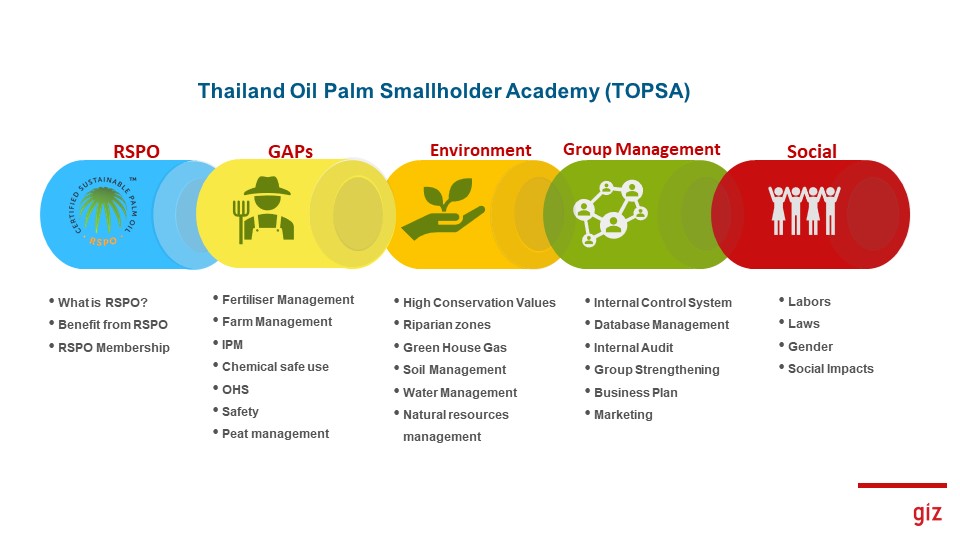Accurate knowledge and adaptation are considered important factors in agriculture
Today, oil palm farmers continue to face such problems as high production costs, low productivity, incorrect practices in the plantation and lack the information that helps them make decisions, all because of a lack of knowledge. Both the public and private sectors in Thailand are trying to impart knowledge to farmers in order to improve or upgrade production to support the continuously growing market for palm oil. But current knowledge consists of scattered academic information and the transfer of knowledge is not systematic, thus severely inhabiting its promotion and dissemination. The result is that the farmers cannot see the real benefits of applying the knowledge they might have absorbed.
The Sustainable and Climate-Friendly Palm Oil Production and Procurement in Thailand project recognises that systematic knowledge will help support and promote the small-scale farmers who produce oil palm sustainably and assist them in reaching the standardised system of the Roundtable on Sustainable Palm Oil (RSPO).
For this reason, the project has collaborated with the Department of Agriculture (DoA) and the Department of Agricultural Extension (DoAE) to develop a training curriculum in sustainable oil palm production for farmers. It is known as the Thailand Oil Palm Smallholder Academy or TOPSA for short.
The TOPSA has been developed taking into account the dimension of sustainable palm oil production and group processes for small-scale farmers in relation to RSPO standards and is made up of 5 modules as follows:
- RSPO Standard: This course focuses on the background of the RSPO standard, why sustainable palm oil production is needed, and the impacts on small-scale farmers when oil palm is required to enter the international standard system. In addition, this course also includes participation and membership of RSPO in supporting sustainable palm oil production.

- Group Management: This course will help farmers to work as a group. They will learn how to manage an internal control system (ICS) and create a database on oil palm production that allows for precise management, while supporting and solving problems as a group. The training will also encourage farmers to recognise the benefits and importance of working together.
- Good Agriculture Practices: This course focuses on good practice to manage high-quality oil palm plants. It covers applying the right amount of fertilisers in palm plantations, sustainable plantation care and management. This will give farmers the knowledge they need to increase productivity and production efficiency.
- Social impact: This course focuses on palm plantations and looks at the minimum unpleasant impacts from oil palm plantations in compliance with related social laws and regulations.
- Environmental impact: This course focuses on growing environmentally friendly oil palm. It is about preserving the ecosystem and reducing the risk to the environment including reducing greenhouse gas emissions.

TOPSA will be delivered by the project to spokespersons or speakers including officials from the Department of Agricultural Extension (DoAE) and the Department of Agriculture (DoA), the leaders of farmers of each oil palm plot and the personnel of extraction plants participating in the project.

“I used to wonder what palm oil could do but never got an answer. I continuously harvested my produce without any concerns about the quantity, quality, or the environment. I have learned a lot from the training and understand that palm oil is more useful than I had thought. As an oil palm farmer, I now understand that without sound management, there will be impacts on the social, economic and environmental aspects such as forests, rivers, wildlife and other living things.
“Therefore, a good model for sustainable palm oil production that is environmentally friendly must be linked to the whole system. I can now be a speaker for the project and I can see that TOPSA is very good. I will also practice what I have learned and make improvements in the way I work. I am confident that this course will enable Thai farmers to move towards sustainability.” Athon Changkham, President of Palm Oil Plot Group, Ao Luek District, Krabi

(Photo credit: GIZ Thailand)
Mr. Sittipas Udomphonkul, Deputy Managing Director of Asian Palm Company Limited
“In the past, training was often put forward or only presented specific issues of interest. There were no formal or systematic processes and no clear set of documents and this meant a lack of continuous knowledge transfer to farmers. Transferring knowledge by supporting farmers to be speakers and combining this with the TOPSA programme is both useful and important because TOPSA will help in the process as well as assist farmers in transferring knowledge to each other. Using the same language makes it easier to understand and the activities focus on clear targets, meaning we can learn faster than before.”

(Photo credit: GIZ Thailand)
